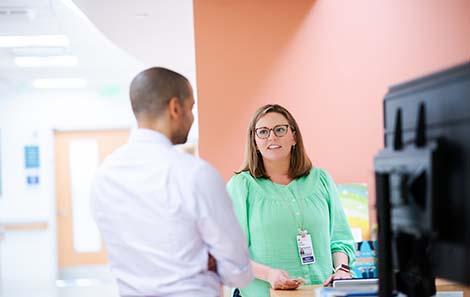Acute Lymphoblastic Leukemia
When your child first started showing symptoms like bruising and fatigue, a doctor suggested testing for cancer. Now, after testing, you have a name for your child’s specific cancer: acute lymphoblastic leukemia (ALL).
At UVA Health Children’s, we have extensive experience treating acute lymphoblastic leukemia in children. With treatment options like immunotherapy, our services are on the cutting edge of care. But we also can offer the resources and support your family needs during this time.
What Is Acute Lymphoblastic Leukemia?
Leukemias are cancers that affect the body’s blood cells. These are the cells that fight off infection and help the body heal.
ALL starts in the bone marrow and then spreads out. As it does, there are more symptoms. While at first symptoms might be mild, they can quickly become severe.
Some of the symptoms include:
- Fatigue
- Abdominal pain
- Bruising
- Fevers
- Infections
- Difficulty breathing
- Tiny red or purple dots (petechiae)
How Is ALL Diagnosed?
Typically, when doctors see persistent vague symptoms (like bruising) they order blood tests. These tests can indicate a blood cancer.
But to specifically diagnose ALL we will need to do a bone marrow aspiration and biopsy.
A sample of bone marrow is removed and examined under a microscope. This allows our doctors to know what specific form of blood cancer your child has.

Precision Medicine
Treatment for ALL
While some treatments for ALL aim at putting the cancer into remission, others are focused on improving symptoms. Both are important.
Blood transfusions
Blood transfusions can make many ALL symptoms better. When leukemia cells occupy your child’s bone marrow, they can’t produce healthy red blood cells.
Red blood cells carry oxygen through the body. This makes it easier to breathe, gives you energy, and helps stop bleeding and bruising. Blood transfusions are often given with chemotherapy, since chemotherapy can worsen anemia symptoms.
Chemotherapy
Chemo works by killing the cancer cells. Chemotherapy can be taken orally, through injection, or with a transfusion. There are different stages of chemo.
These are:
- Induction
- Consolidation
- Interim
- Intensification
- Maintenance
While the first stages of chemotherapy take place at the hospital, sometimes others can be done as an outpatient. Some of our patients even do their chemotherapy at home. Chemotherapy does affect some healthy cells in addition to the cancer cells. This causes side effects that can be very challenging. We offer support to help your child with these side effects.
For childhood ALL, chemotherapy is enough to treat the cancer most of the time. But when it’s not, we do have other options.
CAR T-Cell Immunotherapy
Immunotherapy teaches your child’s immune system to fight the cancer. This treatment is available for b-cell ALL that relapses following chemotherapy.
Types of Acute Lymphoblastic Leukemia
When your doctor talks to you about your child’s ALL diagnosis, they’ll also tell you what type it is. The typing of cancer lets us target it so that treatments are more effective.
T-Cell vs B-Cell ALL
The difference between B-cell and T-cell leukemia is what type of cells are affected.
B and T cells are both types of white blood cells. While both are made in the bone marrow, they mature in different places. B-cells stay in the bone marrow, and t-cells travel to the thymus, a small gland in the front of your throat.
B-cell ALL is the most common form, especially in children. Chemo is typically given in smaller does, over the course of 2-3 years.
T-cell ALL is less common, and more aggressive. Often, an intense chemotherapy treatment plan implemented quickly is our best option.
Philadelphia Chromosome-Positive ALL
A genetic mutation found in some cases of ALL changes the treatment plan significantly. This mutation is called Philadelphia Chromosome Positive All. And it’s very rare.
In the past, treating with chemo alone was often unsuccessful. But adding a type of medication called tyrosine kinase inhibitors (TKIs) has made treatment more successful.
Car T-Cell has also been successful against this particular form of leukemia as well.